Truthdiggers of the Week: Donald Sterling’s Ousters
Somewhere in the story of LA Clippers owner Donald Sterling's downfall is a lesson for communities seeking to regulate the behavior of wayward and destructive bossesSomewhere in the story of the L Clippers owner's downfall is a lesson for communities seeking to regulate the behavior of wayward and destructive bosses.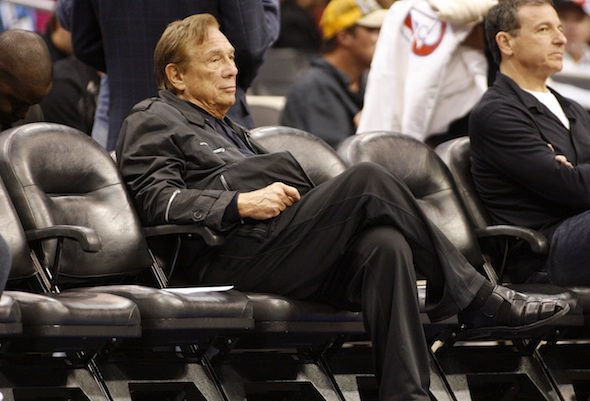
Every week the Truthdig editorial staff selects a Truthdigger of the Week, a group or person worthy of recognition for speaking truth to power, breaking the story or blowing the whistle. It is not a lifetime achievement award. Rather, we’re looking for newsmakers whose actions in a given week are worth celebrating.
In Alfred Hitchcock’s 1944 film “Lifeboat,” based on a story by John Steinbeck, several British and American survivors of a steamship’s run-in with a Nazi U-boat discover they’ve brought one of the enemy ship’s officers aboard the dingy that saved them. After some discussion, some of the group’s members persuade the others to let the man live, arguing that their common humanity and shared interest in survival will compel cooperation among people otherwise at war. This view is revealed to be optimistic when the group discovers the officer has been aiming them toward a German fleet, rather than the band of islands to which they had agreed to go. A scuffle breaks out and the subversive officer is thrown overboard and drowns. “What do you do with people like that?” one of the characters, exhausted, asks.
Contrariwise, in the short view, members of every level of the National Basketball Association, buoyed by support ostensibly from the entire nation, made quick work of Los Angeles Clippers owner Donald Sterling this week, fining him $2.5 million and banning him from the league for life after a recording of him asking a girlfriend not to bring black people to his games surfaced on the Internet.
In the long view, however, Sterling’s ouster wasn’t rapid at all. Public knowledge of his racism — as well as the human cost it’s exacted — date at least as far back as 2003, when he was sued by various parties for trying to drive blacks and Latinos out of apartment buildings he owned in Los Angeles’ Koreatown. He was taken to court again in 2006, this time by the Justice Department, for refusing to rent apartments to black people and families with children. Sterling paid $2.7 million to settle in the latter case. “That’s because of all the blacks in this building, they smell, they’re not clean,” he reportedly told a supervisor of one of the buildings he bought. “And it’s because of all of the Mexicans that just sit around and smoke and drink all day. … We have to get them out of here.”
These ugly events and the language that accompanied them were not merely matters of people not getting to live where they wished. Debarment from neighborhoods that are desirable for one reason or another can have a profound disordering effect upon the disadvantaged’s lives. As Travis Waldron explained at ThinkProgress last month, “housing discrimination and educational segregation go hand-in-hand.” And the problems “exacerbated by discrimination — poverty, violence, teen pregnancy, drug use” go “on and on.”
In the NBA itself, Sterling’s record of sins is comparable. In 2004 he refused to cover Clippers assistant coach Kevin Hughes’ $70,000 surgery for prostate cancer. (The tab was picked up by four players.) He was sued in 2009 by former Clippers general manager Elgin Baylor for envisioning “a Southern plantation-type structure” for the team. Baylor, who lost the lawsuit, claimed that Sterling had once told a player’s agent: “I’m offering you a lot of money for a poor black kid.” Former head coach Mike Dunleavy sued Sterling in 2010 for refusing to pay him money he was owed after he was fired. The team paid Dunleavy $13 million a year later.
So, when racist and antisocial attitudes begin harming lives, when the Donald Sterlings of this world work to harm us, what do we do? For large numbers of NBA players, league associates and others who sensed an opportunity, the answer was to quickly organize a massive campaign committed to making an example of the man by ejecting him from the league. The Clippers considered refusing to take the court for subsequent playoff games, but settled for wearing their warm-up jerseys inside out in an act of silent protest before playing. Some former players, including Magic Johnson and Charles Barkley, condemned Sterling in media appearances and on Twitter. Kareem Abdul-Jabbar asked why the reaction took so long. Why didn’t anyone act during the housing discrimination lawsuits and the years of Sterling’s other known misbehavior?
Perhaps most significantly in strategic terms, Kevin Johnson, a former NBA star who now serves as the mayor of Sacramento, Calif., acted as a representative both for black Americans and the players union in the ordeal, pressuring NBA Commissioner Adam Silver to hit Sterling swiftly and decisively with the maximum punishment possible. Silver slapped Sterling with the consequences Tuesday. The whole unpleasant story, from the spotlighting of Sterling’s bad character to the dealing out of discipline, took less time than a workweek. It was a remarkable mobilization of people and resources.
The NBA is not strapped for cash; its players are not what we in post-2008 America would call struggling workers. But their role in the Sterling saga can be seen as that of members of a community working in cooperation to rid themselves — and their profit-concerned directors — of a serious source of trouble. A lot of possibilities for action were considered and decisions made behind the scene, of course. We do not have a full account of the process of their accomplishment. But Americans light on hope and in need of inspiration have a major contemporary example of what they can achieve if they work together. And since America’s problems are bigger than the Donald Sterlings, the David and Charles Kochs, or the Barack Obamas of the world — they in fact consist of the conditions that create them — those of us who would like to have and enjoy a collective future must give their best effort to do so. For bringing our attention to that, everyone involved in throwing Donald Sterling out of the boat is a Truthdigger this week.
Your support matters…Independent journalism is under threat and overshadowed by heavily funded mainstream media.
You can help level the playing field. Become a member.
Your tax-deductible contribution keeps us digging beneath the headlines to give you thought-provoking, investigative reporting and analysis that unearths what's really happening- without compromise.
Give today to support our courageous, independent journalists.
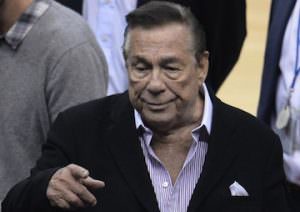
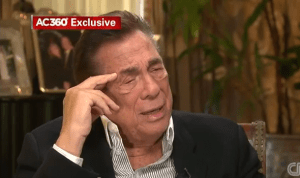
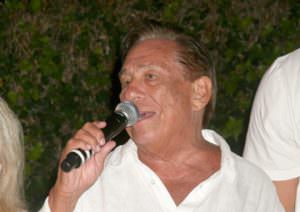
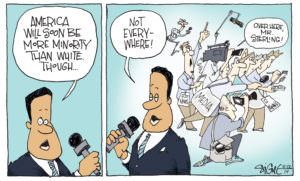
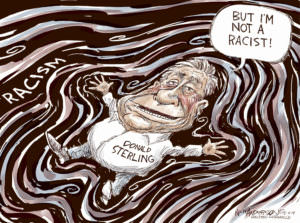
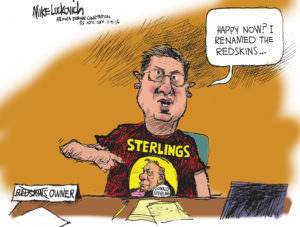
You need to be a supporter to comment.
There are currently no responses to this article.
Be the first to respond.